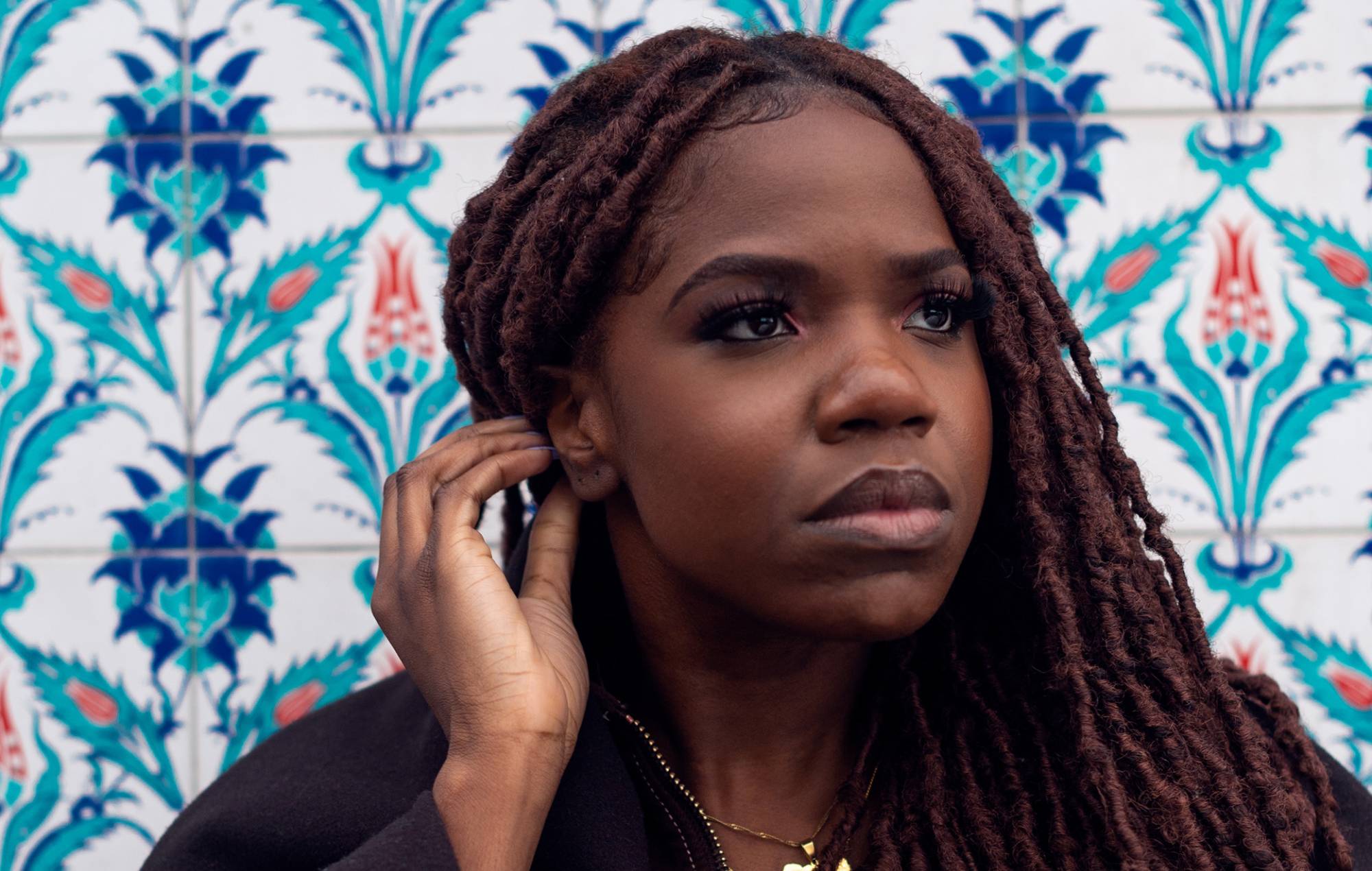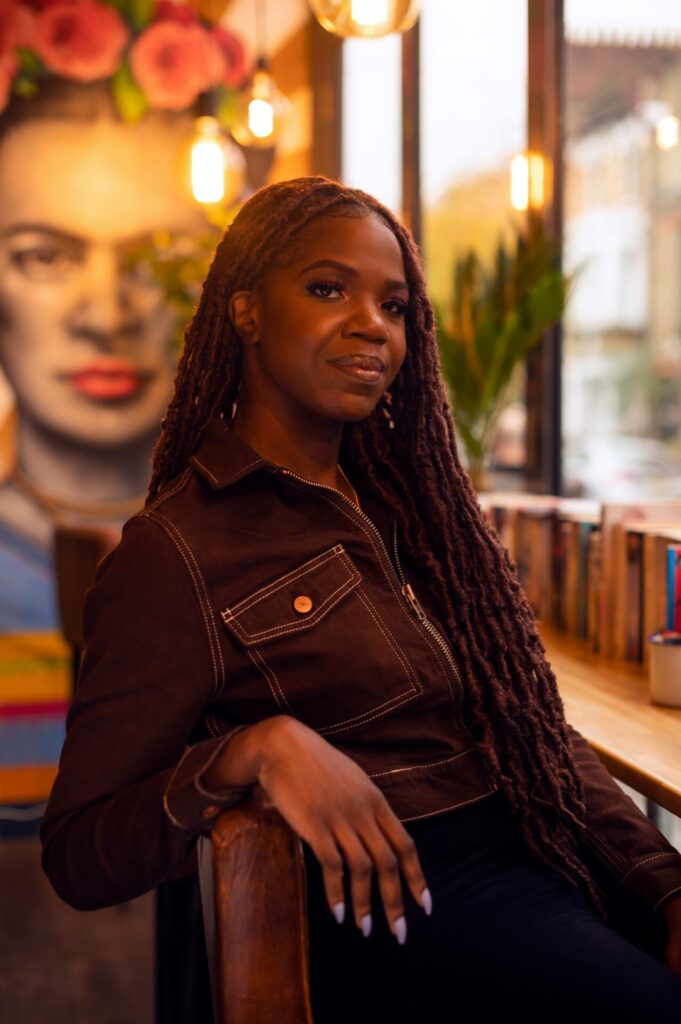ENNY on ‘Peng Black Girls’ success and her journey in music so far
South London artist Enny is so much more than the “conscious rapper” she’s been dubbed on her rise to glory. She’s grounded, thoughtful and has used that much-praised grace to defy every label on her ascension

“DO I SEEM confident, even right now? I drank a lot of wine yesterday so maybe it’s still in my system.” I’m sitting in the recording booth of Root 73 in Dalston with 26-year-old Enitan Adepitan, better known to audiences as Enny. It’s the morning after an industry event and she’s explaining to me that, despite her success, she’s still a little shy and introverted, her humble nature bordering on imposter syndrome (though she’s working on it, she says).
As we discuss her career so far, it’s clear that Enny is still struggling to grasp her rapid trajectory. It’s the second time I’ve spoken to the artist this year, and I’m learning that self- deprecating jokes such as the former appear frequently in her conversations. “Jokes” is how the artist very often describes her current positioning as one of the most prominent rising stars in the country. Only last night she picked up an A&R Award at a ceremony attended by the likes of Stormzy, following on from the GRM Rated Award she bagged back in September. She’s also been nominated for a few MOBOs, and at the end of 2021 is set to be on tour with Little Simz and Saba of Pivot Gang. She’s excited, but still fairly reserved about it all. “I don’t feel famous. It’s not like I’m Billie Eilish,” she laughs.
We’re in a poignant setting; it’s in this very studio that Enny started her journey as a musician, where she’d come to work with manager-producer hybrid Paya, who briefly pops in while we speak. Any other artist would be inflated by this point, but she’s keeping grounded; in person she’s softly spoken and speaks nimbly, such is the yin and yang of her on and off-stage personas. I point to a recent performance I’d attended of hers at The Lexington where she’d commanded the crowd with ease. It’s there where the shyness melts away, she says. “Performing, I would say it’s powerful. You feel powerful,” she says wistfully. “You can be as crazy as you want and no one’s gonna judge you. When you see people looking at you, and you know they see the music, the lyrics and see the story, it feels like I’m seen.”
That form of seeing is likely mutual. Many of Enny’s fans love her because of her subject matter, which often reflects the trials of young adulthood for many other Black women of our age, covering love and relationships, gentrification, body-image issues. The appeal is that nothing about her is manufactured; she says exactly what she thinks, bolstered by a clear lyrical talent that surpasses many of her peers. This frankness is what we get with Enny, even though that confidence is still in development underneath.
In terms of biographical facts, her story till now is well known. Enny is native to Thamesmead, south-east London, the youngest of four siblings in a Nigerian family. She became attuned to rap in her younger years via the music played by other family members at home, soaking up grime artists like Linus through the pirate radio her older sister would leave on at night.
As she struggled to make her way in music, Enny worked a regular 9-5 in a bank, employed by an uncle, all the while releasing a drip- feed of freestyles online and performing at open mic nights around London. These are the experiences that shape her lyrics: the time she’s spent living with family, having dreams of making music and hanging with her secondary school friends that she’s been close to for “over a decade”.
It’s this that culminated in last year’s ‘Peng Black Girls’ with Amia Brave, a blowout single eventually remixed by singer Jorja Smith. The single came as a rallying cry for her own demographic, inspired by her feelings around the presentation of Black women in the media. As a dark-skinned woman, she realises hers is a face that represents the darker girls who themselves were never seen. “It’s so sick to see Tems, Simz and Amaarae, all these dark-skinned girls doing their ting. We never got to see that growing up; young, Black, dark-skinned girls just doing their ting. That’s why I’ve gotta take it as far as I can.”
It’s this same subject matter that’s had her widely pinned as a “conscious rapper”, her music a supposed foil to artists whose content is more leisurely or recreational, especially if there’s any mention of sex, partying and drugs. As a woman in the rap industry, the phrase is particularly used to form a contrast to her female counterparts, who are often denigrated for this style of rap. “I don’t like the ‘conscious’ thing, because it’s deffo just common sense,” she offers. “I’m not, like, talking about deep, deep, deep stuff, I’m proper just saying, ‘Don’t gentrify the area.’” She points to her most recent single ‘Bernie Mac’, a club-ready take on Mr. & Mrs. Smith with Odeal. She doesn’t want to be put in a box: “Hip hop is so diverse. You look at people like Kendrick Lamar, who can do songs like ‘Humble’ and then do songs like ‘Alright,’ and then ‘These Walls’ or a freakin’ song with Maroon 5.”

On a personal level, entering the music industry has set her on a transitional phase in figuring out her identity and dealing with the lifestyle; the business of making music, the hectic schedules, the narcissistic nature of constantly having to talk about yourself. “Interviews, stuff like this, can be the things I don’t think are beneficial to people’s egos,” she says. “To talk about yourself so much, I just don’t think that’s something people should do. So, when the job requires it, it’s a lot.”
It’s easy to get distracted from what grounds her. In this instance, it’s her Christian faith, the very thing that pushed her to leave her job in the bank when she did. As it’s a religion we both share, I wonder how her beliefs mix with her mounting success, and whether it still grounds her now. “I think that’s where my struggle is,” she confides. “Sometimes I just like going with the flow because it’s easier to say, ‘What will be will be.’ But I’m trying to get back to the spiritual side and religion, just trying to make sure I make the right decisions.
“Leaving my job, I was in tune [with my faith]. I wasn’t at church, but I was very into everything. And then so much has happened, you don’t want to get so distracted that you can’t remember what got you there, what you lean on and what you’re accountable to.” Right now, it’s a difficult act of making sure she levels both; she points to imaginary scenarios where her faith might lead her in a different direction from that of her team. Setting her path in line with religion could be challenging, she shares. “I’d like to believe I would be confident enough [to achieve that]. But I just feel like in the space I’m in right now I probably wouldn’t. I have a lot to work on, on that side of things.”
They’re big ruminations for someone so young in the game. The questions of who she is, and where she’ll go in her career are immense, if not intimidating; we could easily see the artist on a path akin to Simz, Kano and the like. But on the music front at least, Enny seems ready to start answering them. “My main concern is not losing the integrity of the music,” she says. “And I think that it’s so easy to do, especially when you get to a certain point in your career. I want to do as amazing as I can but I also want to be true to the sound; I’ve been in that space, like, ‘Why is this artist making music like this now?’ But then you get inside and you realise the challenges and the game, that it’s truly a game. So yeah, all that stuff is maybe weighing a bit,” she admits before reconsidering, “not weighing, but I’m aware of it.”
For most of her life, making music has meant reverie, catharsis, and has acted as a canvas for her life. “When music becomes work, then it’s not escapism, it’s your job. You’re going to the studio to make a song because you need the song to chart, or because you need it to stream. You need people to be aware of the song you’re dropping; now you’re looking at YouTube views, you’re looking at everything and I think that shit isn’t healthy. Especially for the artist I want to be.”
And is creation still escapism? “When it wants to be,” she replies, wistfully. “I was listening to Lauryn Hill’s Unplugged and she’s got the interludes. She was saying, ‘How did this thing that I loved so much turn into something that I hated?’ And I remember just feeling, like, I get that. I just need to remember to have fun. When you overanalyse it and put too much pressure on, that’s when it just becomes a job, and it’s not fun any more.”
For now, it’s a case of going where the spirit moves her as an artist. My mind is cast back to the video from her latest release; the image of Enny in a sleek two-piece suit and shades, gun in hand, the girl who at once talks her shit “just like the guys do”, only to then “flip it like a haiku”. She wants to refuse that tricky label of “conscious rapper” or any other term that could be placed on her in the future. “That’s why there’s songs like ‘Bernie Mac’!” she says, laughing. “It’s about being all-rounded, I don’t want to be put in a box.
